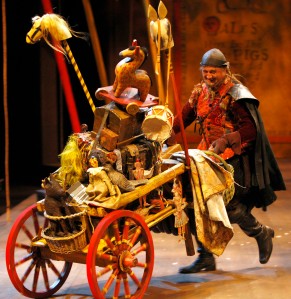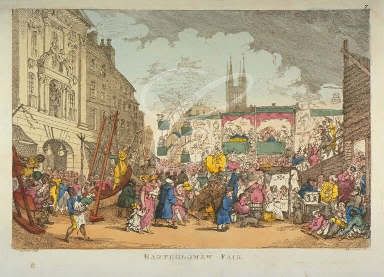
August 24th, St Bartholomew's Day
Almost nothing is known about Bartholomew, one of the twelve apostles. However, his nameday is remembered in the context of two events: the 1572 assassination of the leaders of the protestant Huguenots in Paris that led to the massacre by Catholics of tens of thousands of Huguenots across France; and one of the great English Fairs, the St Bartholomew's Day Fair.
The priory of St Bartholomew, West Smithfield, was one of the most important of the City of London's monasteries. Its monastic church and hospital were established in 1123 and its annual fair, first held in 1133, was an important source of revenue for the priory.
The Fair was held annually every August 24th, Saint Bartholomew’s Day, at Smithfield, just outside the London city walls. Most of the great fairs of medieval Europe operated under patronage, either of the sovereign power or municipal authority of the region, or of the church, and many were held on the sites of regular weekly markets. Bartholomew Fair was run under a charter held by the prior of St. Bartholomew and, in spite of the dissolution of the priory in 1538, survived until 1855.

In 1604 the Fair was taken under the control of the City of London and subsequently opened each year by the Lord Mayor. 'By that time,' wrote Richard Cavendish in History Today [55(9) 2005],
'the fair had become far more of a carnival than a business function. Puppet-shows, wrestlers, fire-eaters, dwarfs, dancing bears, performing monkeys and caged tigers vied for attention with contortionists and tight-rope walkers. Astrologers cast horoscopes and miraculous medicines were hawked. Proprietors of food and drink, beer and tobacco, bellowed for custom amid a miasma of roast pork. There were plentiful supplies of toys, gingerbread and mousetraps, puppies, purses and singing birds in a general bedlam of shouts, fiddles, drums and rattles. The fair was one of the year’s great opportunities for pickpockets, naturally, and also for prostitutes, who might be found in tents coyly labelled ‘soiled doves’ or in a nearby street appropriately named Cock Lane.'
It is this fair of the early Stuart period that the dramatist Ben Jonson drew from in his 1614 comedy.

In the agreement presented by a Scrivener in “The Induction” to Bartholomew Fair, Jonson promises the audience a new play ‘merry, and as full of noise as of sport: made to delight all, and to offend none’. For their part the audience are to agree: to ‘remain in the places their money or friends have put them in, with patience, for the space of two hours and an half, and somewhat more’; to keep their censure of the play proportionate to their entry price - ‘if he only paid sixpence at the door then he is only entitled to six pen’orth of censure’; and to make up their own minds as to the merit of the work, uncontaminated by those around them or by preconceived expectations.
The noise and sport of Bartholomew Fair are provided by a cast of locals and visitors. There are hawkers, hucksters and pedlars, stall-holders and booth-owners - a seller of gingerbread, a seller of toys (hobby-horses, rattles, drums, toy soldiers, dolls), a costermonger selling pears, a tinderbox-man selling mousetraps and flea remedies, and sellers of ale, ballads and roast pig. And there is the cutpurse or pickpocket - ‘Just as Lent is to the Fishmonger’, wrote a pamphleteer in 1641, ‘so is Bartholomew Faire to the Pickpocket.’ Into the fair’s atmosphere of joshing and banter, bargaining and fraud, theft and frivolity, Jonson introduces two characters, each of whom represents a potential source of constraint on the unbridled freedoms of the fair, on unfettered market exchange.

The first of these characters, Adam Overdo, is representative of the secular regulation of the fair. As a Justice of the Peace, Adam Overdo has responsibility for presiding over the Piepowder Court that adjudicates on disputes between dealers and between dealers and customers at the Fair. Distrusting the information he has access to in disputes, the overenthusiastic Overdo takes on a variety of disguises as he seeks out the ‘enormities’ of the Fair - traders’ tricks for short-changing and cheating their customers. These disguises are designed to let him go ‘into every alehouse, and down into every cellar; measure the length of puddings, take the gauge of black pots and cans, aye, and custards, with a stick; and their circumference, with a thread; weigh the loaves of bread on his middle-finger; then would he send for’em, home; give the puddings to the poor, the bread to the hungry, the custards to his children; break the pots and burn the pans, himself; he would not trust his corrupt officers; he would do’t himself.’ In practice the disguises merely produce ridicule and embarrassment for the gullible and luckless Overdo.
Alongside the legal busybody, Jonson presents Overdo’s moral equivalent, the puritan Zeal-of-the Land Busy. Visiting from out of town with a number of fellow puritans, Busy disdainfully presents the fair to his companions as a showplace of corruption and moral degeneracy: ‘the place is Smithfield, or the field of smiths, the grove of hobby-horses and trinkets, the wares are the wares of devils. And the whole fair is the shop of Satan!’ As the play progresses, the hypocrisy of the pompous Busy is revealed and he too becomes the butt of ridicule and derision.
Clearly, misgivings about the values of the unregulated free market, and cynicism regarding the efficacy of secular or spiritual control of that ‘Mistress Commodity’, self-interest, have a long standing history.


No comments:
Post a Comment